'Fist Fight': 'Always Sunny' Director on Shooting His First Feature with Comedy Giants
'Always Sunny in Philadelphia' director Richie Keen has moved into feature film territory with Charlie Day, Ice Cube, Tracy Morgan, and more.
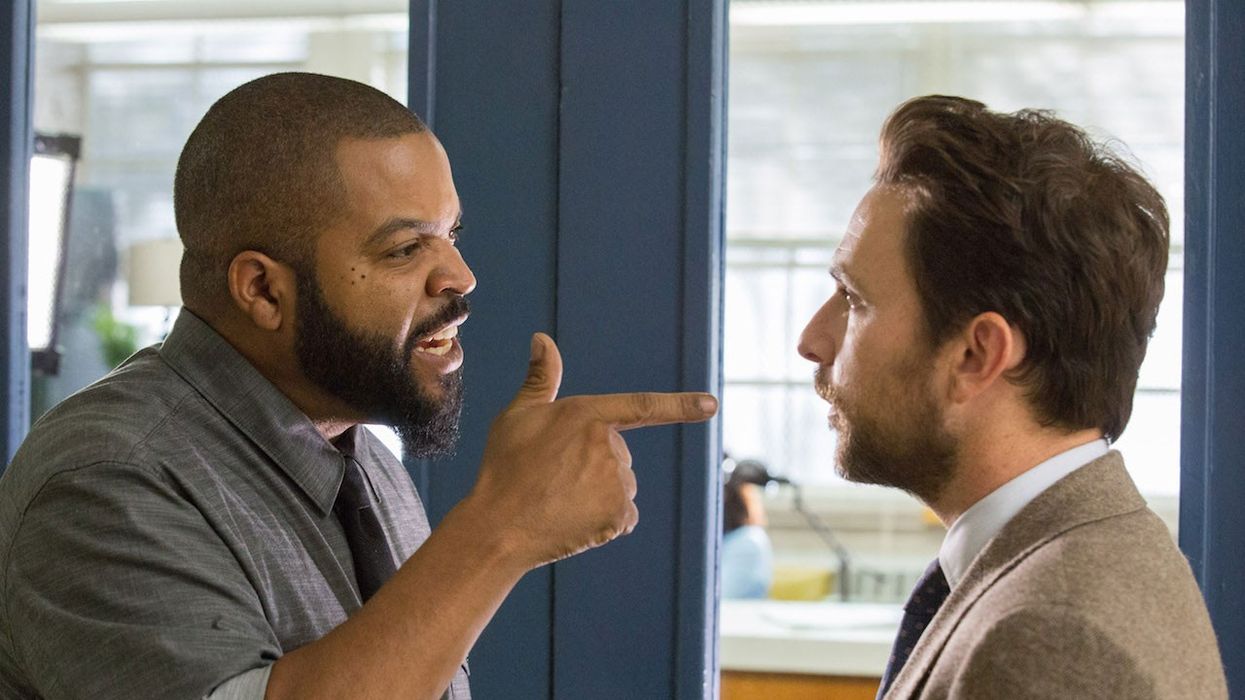
In a high school overrun by lawless students, senior prank day doesn't mean washable graffiti—it means all out war. And not just for the kids. Fist Fight focuses on what happens when two (very different) high school teachers both reach wits end. Charlie Day [Always Sunny, The Lego Movie] and Ice Cube [Friday, 21 Jump Street] are set to rumble at 3pm in the parking lot.
Based on the premise, it seems like a pretty unfair fight, and the makings for a very short movie. But what actually unfolds is the hilarious odyssey of Charlie Day's complete mental breakdown. With on-point performances across the board, Fist Fight is the first laugh-out-loud studio comedy theaters have seen in a long time.
No Film School sat down with director Richie Keen, who built his career acting and directing for television, before the film's opening weekend. He told us about collaborating with comedy's biggest actors, how he never went to film school, convincing a 10-year-old's parents to let her rap to Big Sean, and his experiences sneaking onto movie sets as a child.
No Film School: You have a lot of experience directing for television, and this is your first feature. I am interested to know how directing for film is differed for you from directing for TV?
Richie Keen: I came to directing because, for a decade, I was an actor and a comic, and then I started being a private acting coach. And so I started thinking, 'Oh, I'm kind of directing these people, I'm kind of like an actor's director.' I didn't know anything about cameras. Not to date myself, but the first thing I ever made was in 2005, and YouTube had just come out, so there weren't people making their own content. There were the Lonely Island guys, and It's Always Sunny in Philadelphia had just come out, and they had made their own pilot. So I was inspired by all of those guys to go make my own pilot. So I put myself through film school.
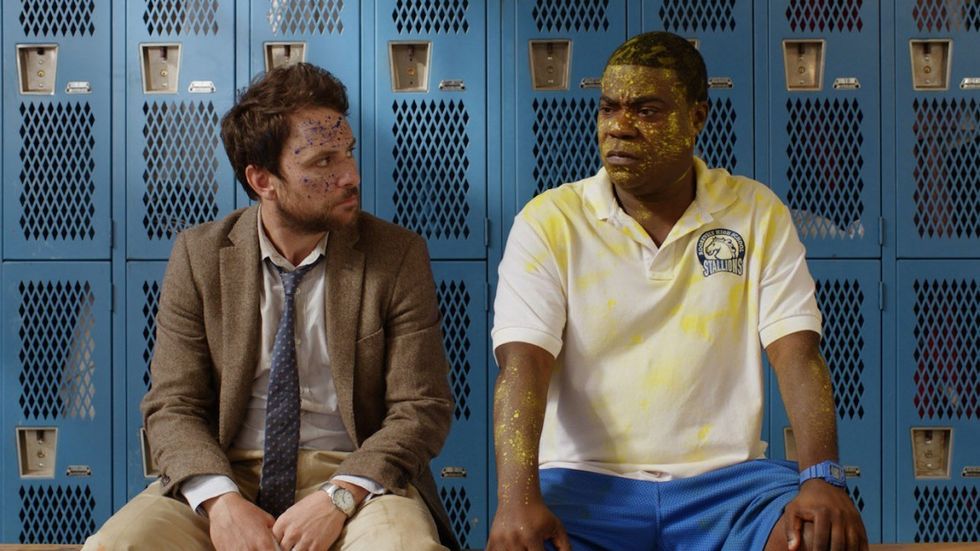
Keen: The reason I bring that all up is because I approached directing TV then, the same way that I approach directing a movie. I don't know what you're supposed to do. I'm a cinephile, so I've watched every movie you would watch in film school. And I just always say: 'What would I like?' And so I approached directing this movie the same way I approach the work in television—what shows do I like, why do I like them, why don't I like these other shows? Why would I move the camera here, what does that convey about the character?
I have a philosophy that the movement of the camera should usually help you feel what the main person is feeling. So I didn't really approach directing the movie any differently, it was just a much bigger undertaking.
"I have a philosophy that the movement of the camera should usually help you feel what the main person is feeling."
NFS: I would love to hear more about your casting process, because this cast is stacked but it's also very unique. Did you know who you wanted going in? Did you audition these huge people?
Keen: So, I was so lucky. I inherited Ice Cube and Charlie Day. They had signed on and I was so excited because I kept thinking if I get this movie, those two guys next to each other on a poster are just funny to look at.
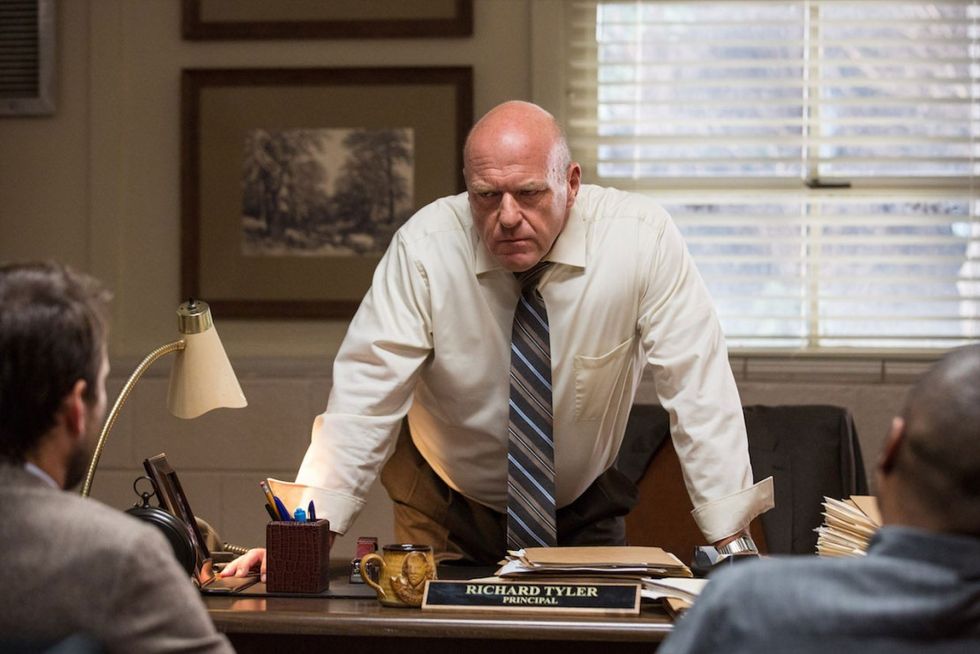
Keen: What I did next was take an amazing script that Evan Susser wrote and start to tailor the roles to the people I thought would be truly special. Tracy Morgan hadn't done anything since his accident. I think he's one of a kind and I said I would bet on this guy, I know he's gonna pull through, so we re-wrote the role for Tracy. Jillian Bell's role was written for a guy. I remember calling Charlie one night, and 22 Jump Street was on cable, and I was re-watching it. [Bell] just steals the movie. And I said, 'I think your buddy should be a girl. I think it should be Jillian Bell. I think when Jillian Bell is doing drugs and wanting to sleep with students, weirdly you root for her. If it's a guy it's gross.'
NFS: It's better!
Keen: Way better. Then when it came to the principal, Breaking Bad is my favorite show of all time. I thought, what about Dean Norris? And everyone thought it was such a weird choice; he's not usually in comedy. But if Dean Norris is being terrorized by senior pranks all day, and he's gotta fire a bunch of teachers, and he's angry, and Charlie's sitting in an office with Dean Norris and Ice Cube, you're scared and you not sure who to be more scared of. So he said yes, and then my job was to make sure that Dean's comedy was in the same tone as Tracy's comedy, and vice versa.
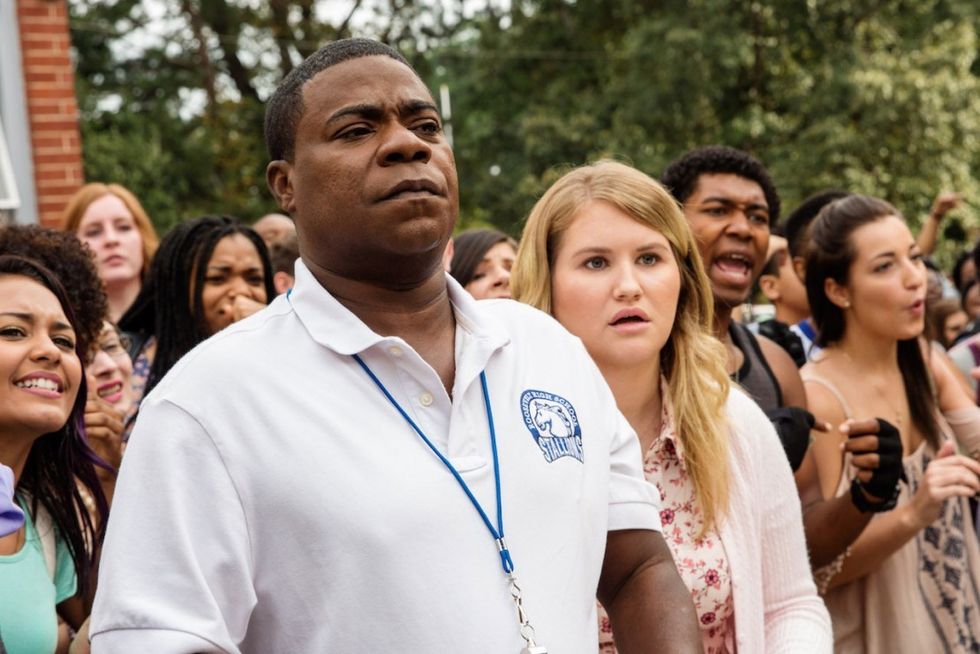
NFS: Was it very collaborative?
Keen: Yes. It was so collaborative from the beginning. Ice Cube said to me before filming, 'I wanna be different in this than anything I've ever done.' And when we were re-writing the character for Ice Cube—because it had been written more for a guy like Danny McBride, who would have been great, too—we decided we wanted to take him out of his lane a little bit, and let him have some physical comedy and let him be funny. He's the straight man in almost everything and he's great at it, but I said, 'Look man, I want you to do some crazy stuff, and I also want you to be able to be really subtle and scary.'
"I would be insane not to let Tracy Morgan improvise for a few takes."
In 21 and 22 Jump Street he's purposefully playing an angry black guy and I said we're not doing that. And Charlie's fingerprints are all over this movie—thank god—I couldn't have made this movie as well without him. He had so many amazing ideas and I took every one of them. I would be a fool not too. And likewise with everyone else, I would be insane not to let Tracy Morgan improvise for a few takes. I would be insane to not let Kumail and Jillian improvise for a few takes, and we always did. And sometimes we used it and sometimes we didn't but the great thing is that I don't think you can tell where they did and where they didn't. Some of the jokes that you probably think are improvised were written and vice versa.
NFS: So I'm gonna take it back to the beginning. How did the script come to you?
Keen: So I was a director that no one had any interest in for directing features—certainly not studios. But I started reading studio scripts anyway. And then I read Fist Fight.
I grew up outside Chicago when John Hughes was making all of his movies, literally as a little boy I rode my bike and snuck on the set of Ferris Bueller. So I read this movie and I was like, "This is a rated-R Ferris Bueller." It's got all the John Hughes stuff. It all takes place in a day, it takes place in a high school, it's the day that changed someone's life. It was that, plus all the twisted shit I'm into now. So I thought, "I know what to do with this movie." And oftentimes [directing], I would ask myself, what would John Hughes do? I cast local kids. I went to Atlanta, and I said send me your local kids, I don't care if they've done anything. Charlie's daughter in the movie (Alexa Nisenson) is gonna be a huge star, and somewhat steals the movie with her big scene. She's a local girl.
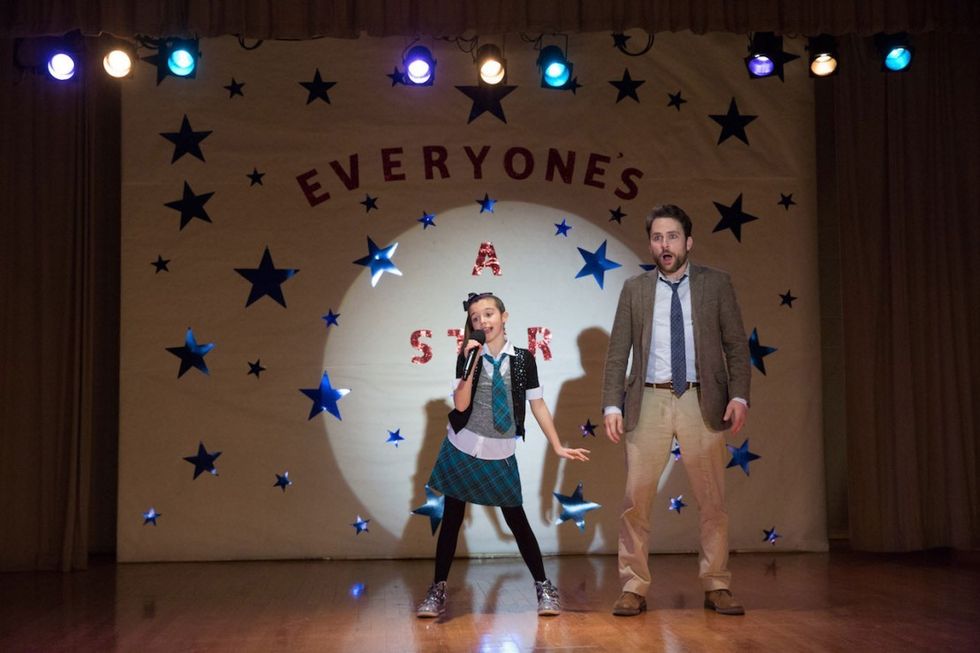
NFS: Was it difficult to get her parents to agree to that scene?
Keen: It's funny, in the original script it was a Kanye West song, Power. And we cast her off that, cause she was so phenomenal. And right before shooting I found out we couldn't afford Power, and I was devastated. I was like, "Oh my god, how do you replace a Kanye West song?" So I said, "Well, what can we afford?" and they sent me a hundred songs that we could afford. And in that stack was this Big Sean song (I Don't F*ck With You). And I called Charlie up, because I needed his permission. It's his big scene, and I said, "I found a song, it's very different, it's gonna change the whole movie, I really think we should do it."
"Oftentimes, I would ask myself, what would John Hughes do?"
And he listened to it and he had a brilliant idea. He said, not only should we use it, we should make it so the daughter is getting bullied too. Because in the original script the daughter was just a fan of rap music, and he was letting her down by not showing up. And by picking that song and Charlie having that idea, we were able to explore a father being bullied and a daughter being bullied and how they deal with it in different ways. So then I had to go to her parents and say, "Hey, we've chosen a new song. It's filthy. I really hope you do it, and I just want you to know that I think this may be the scene people talk about, more than the fight." And they heard it and said, "We trust you. We know you'll make her look good, let's go for it." And we did.
NFS: It's an amazing scene. So, how did you go about writing the pranks? Was there a lot of spitballing? Were there any really good ones that didn't make it into the movie?
Keen: That's a good question. So Evan and Van, the writers, were so smart to put a couple pranks in the original script and show that it was the last day of school and it was a little crazy. But I kept saying to them, we gotta go way further with this. It has to be that the entire school is being slowly taken over, and it needs to build up to something physical, so that you get why Charlie's snapping. He's now been injured. It's not just like people have been graffiti-ing his chalkboard. So we just kept trying to push on what would be crazy.
We did all sit around and have a conversation about senior pranks we'd done, seen, wanted to do, or heard about. In my high school, we had talked about taking apart the principal's car in the parking lot and reassembling it in the lobby so you couldn't get it out. I don't know how to take a car apart, but it I put it in the movie. From our producer Dan Cohen (Stranger Things), we'd heard about this mariachi band that followed around a teacher. We wanted to show like things were falling apart. So the pranks were just something that were really fun to dream up.
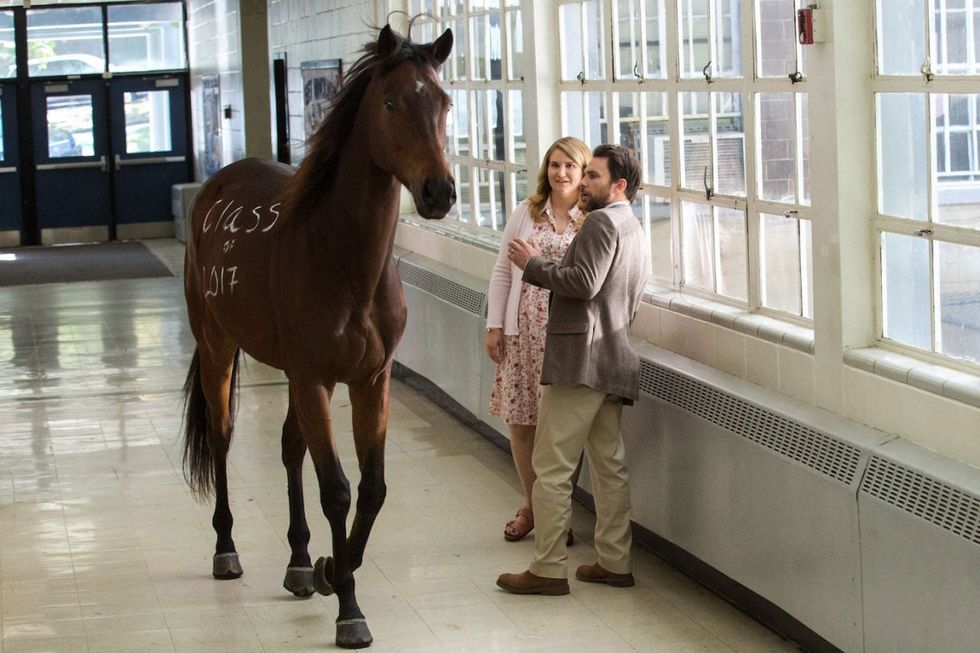
NFS: Was there any pranking going on off camera?
Keen: It's funny. As much as I used to be a comic, and liked to mess with people, I feel like my job as the director is to make everyone feel safe all the time. I want everyone to know "Richie's got my back, he's taking care of me," so I don't do any pranks. And I think everyone was absolutely terrified to prank Ice Cube. Like, as great as Ice Cube is, and—he'd hate me saying this, he's the nicest guy in the world—but I think you don't want to take it too far and mess with him. So it wasn't that there was pranking going on, what was really cool was the entire cast hung out on set and no one would go back to their trailers.
"At the end of the day your job as a director is to say, 'I know what I want this to be. I may be right, I may be wrong, but I got stick with it.'"
NFS: What would you say is the hardest thing about directing comedy?
Keen: Man, comedy's pretty binary. People laugh or they don't. I always say comedy is a democracy. And it's hard to direct in a vacuum because the audience is so important. The hardest thing is assembling the group of people who have the same taste as you do. If you're working with people who have a broader sense of comedy or a more subtle sense of comedy, you've gotta know what you want and bring them to your tone, and so this one I know works because I've watched 15 audiences watch it.
So what did you use as your markers on set, to know for yourself?
Keen: I just kept saying, "Do I find this funny?" And at the end of the day I think that's all you could really do. I mean when you've got Ice Cube and Charlie and Tracy, and you've got people on set that are really funny and smart, they have opinions too and that's great. But really at the end of the day your job as a director is to say, "I know what I want this to be. I may be right, I may be wrong, but I got stick with it." And then when you get into editing, you make sure that you have choices. So, if someone yelled the line, make sure that they have a take where they don't yell the line, so in case you're putting it together and you go, "Oh that feels like too much." So a lot of shooting is just gathering the bricks for your house and deciding later which ones to use.
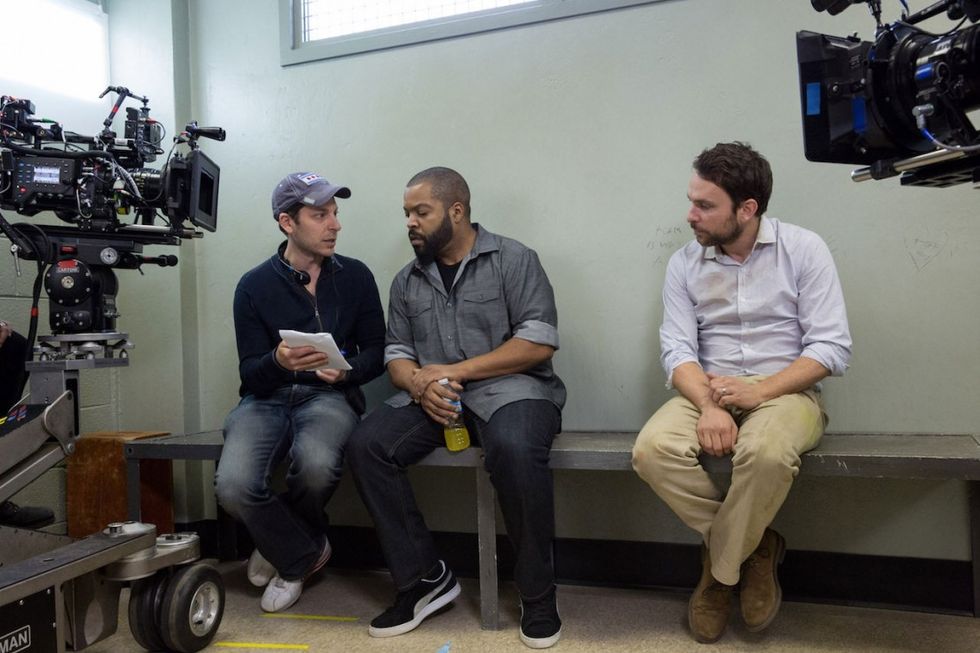
NFS: When you're making an effective comedy, so many elements of craft have to be so tight, like the edit, the camerawork, and obviously the acting. Do you have any technical tips, things that you learned doing this or in your history with comedy?
Keen: As I said, I didn't go to film school, so I learned a lot about lensing and lighting over the course of 50 episodes of television. On this, there were a handful of very complicated shots on cranes; we have a shot that sort of introduces the fight and comes over the roof and flies through the air and lands in a tight shot of Ice Cube and Charlie. It was really important to me that we get it. So I went to the producer and the cinematographer and I said, "I think we should rent a crane and a camera a week before we start shooting. And we should get our guys together and we should rehearse the moves, because if we have 700 extras here and we're not sure how to do this, it's gonna cost us so much time and money." So for me, I was able to rehearse some of my hardest camera moves. Even though it cost us money, it actually saved in the end.
" I didn't go to film school, so I learned a lot about lensing and lighting over the course of 50 episodes of television."
I'm just wondering, when you snuck onto Ferris Bueller, what was going on that day?
Keen: Okay, so I have some vague memories of a bunch of sets I snuck on to and I'll tell you what they are. We went and watched Ordinary People filming, they were filming a scene with a car in a driveway. They were filming Risky Business at my friend's house and I remember my dad throwing the football around with Tom Cruise, who at the time was unknown. Ferris Bueller was when they were doing the car going off the garage into the ravine, that's down the street. And Home Alone, was filming when I was in high school, and I remember there was this scene where Macaulay Culkin is walking along down the sidewalk, and he looks through a window and sees a family having a nice dinner together and he realizes he's alone.
Those are scenes that stick out as scenes where I was standing there watching. It didn't occur to me to be a director, but I just thought, "I want to be a part of this, this is so cool! This is just the coolest thing." Those were transformative moments for me in my life. Being in the suburbs of Chicago, getting to see that people go to work and make movies. That's not just something that magically happens elsewhere. And I'm just so grateful I got to witness that.
'Fist Fight' opens in theaters on February 17, 2017.
Featured Image courtesy of Warner Bros. Pictures












